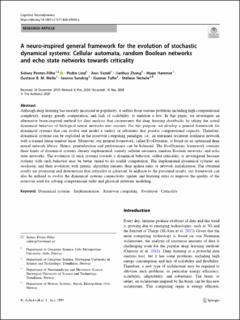| dc.contributor.author | Pontes-Filho, Sidney | |
| dc.contributor.author | Lind, Pedro | |
| dc.contributor.author | Yazidi, Anis | |
| dc.contributor.author | Zhang, Jianhua | |
| dc.contributor.author | Hammer, Hugo Lewi | |
| dc.contributor.author | Mello, Gustavo | |
| dc.contributor.author | Sandvig, Ioanna | |
| dc.contributor.author | Tufte, Gunnar | |
| dc.contributor.author | Nichele, Stefano | |
| dc.date.accessioned | 2020-06-12T05:38:02Z | |
| dc.date.available | 2020-06-12T05:38:02Z | |
| dc.date.created | 2020-06-11T15:02:53Z | |
| dc.date.issued | 2020 | |
| dc.identifier.citation | Cognitive Neurodynamics. 2020, | en_US |
| dc.identifier.issn | 1871-4080 | |
| dc.identifier.uri | https://hdl.handle.net/11250/2657791 | |
| dc.description.abstract | Although deep learning has recently increased in popularity, it suffers from various problems including high computational complexity, energy greedy computation, and lack of scalability, to mention a few. In this paper, we investigate an alternative brain-inspired method for data analysis that circumvents the deep learning drawbacks by taking the actual dynamical behavior of biological neural networks into account. For this purpose, we develop a general framework for dynamical systems that can evolve and model a variety of substrates that possess computational capacity. Therefore, dynamical systems can be exploited in the reservoir computing paradigm, i.e., an untrained recurrent nonlinear network with a trained linear readout layer. Moreover, our general framework, called EvoDynamic, is based on an optimized deep neural network library. Hence, generalization and performance can be balanced. The EvoDynamic framework contains three kinds of dynamical systems already implemented, namely cellular automata, random Boolean networks, and echo state networks. The evolution of such systems towards a dynamical behavior, called criticality, is investigated because systems with such behavior may be better suited to do useful computation. The implemented dynamical systems are stochastic and their evolution with genetic algorithm mutates their update rules or network initialization. The obtained results are promising and demonstrate that criticality is achieved. In addition to the presented results, our framework can also be utilized to evolve the dynamical systems connectivity, update and learning rules to improve the quality of the reservoir used for solving computational tasks and physical substrate modeling. | en_US |
| dc.language.iso | eng | en_US |
| dc.publisher | Springer Nature | en_US |
| dc.rights | Navngivelse 4.0 Internasjonal | * |
| dc.rights.uri | http://creativecommons.org/licenses/by/4.0/deed.no | * |
| dc.title | A neuro-inspired general framework for the evolution of stochastic dynamical systems: Cellular automata, random Boolean networks and echo state networks towards criticality | en_US |
| dc.type | Peer reviewed | en_US |
| dc.type | Journal article | en_US |
| dc.description.version | publishedVersion | en_US |
| dc.source.journal | Cognitive Neurodynamics | en_US |
| dc.identifier.doi | 10.1007/s11571-020-09600-x | |
| dc.identifier.cristin | 1815092 | |
| dc.description.localcode | Open Access This article is licensed under a Creative Commons Attribution 4.0 International License, which permits use, sharing, adaptation, distribution and reproduction in any medium or format, as long as you give appropriate credit to the original author(s) and the source, provide a link to the Creative Commons licence, and indicate if changes were made. The images or other third party material in this article are included in the article's Creative Commons licence, unless indicated otherwise in a credit line to the material. If material is not included in the article's Creative Commons licence and your intended use is not permitted by statutory regulation or exceeds the permitted use, you will need to obtain permission directly from the copyright holder. To view a copy of this licence, visit http://creativecommons.org/licenses/by/4.0/. | en_US |
| cristin.ispublished | true | |
| cristin.fulltext | original | |
| cristin.qualitycode | 1 | |

